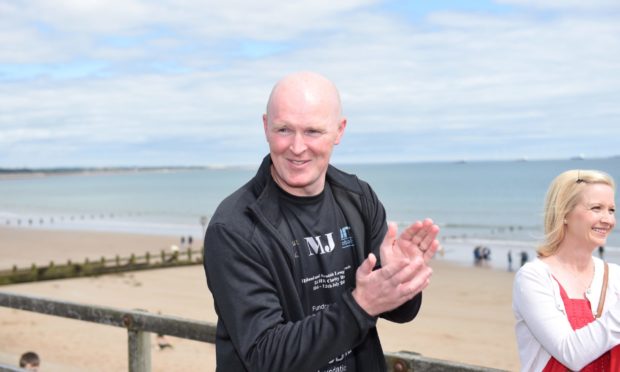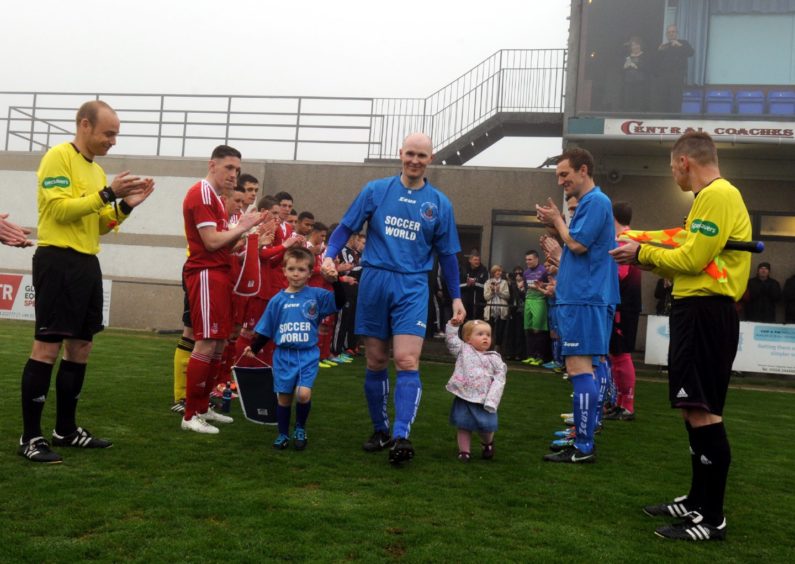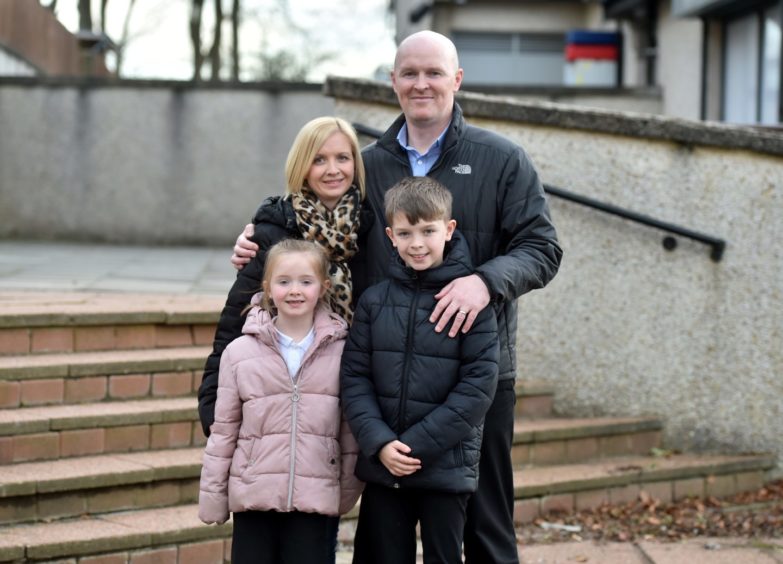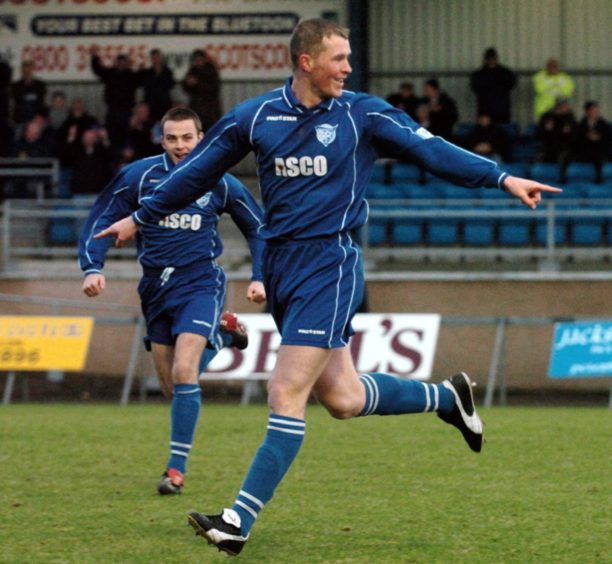When Martin Johnston was diagnosed with Motor Neurone Disease in 2018, the sleepless nights that followed were inevitable.
A life-limiting illness which has afflicted some high-profile individuals – Stephen Hawking and Doddie Weir to name two – MND could have taken Johnston one of two ways.
He could have dwelt on the negative impact of his condition and tried to live a quiet life. But as a popular former footballer, the other route, raising funds and raising morale of those around him, became his path of choice.
“I try to have as much a life as possible and try not to let it affect me too much,” he said. “You do sometimes look ahead and worry a little bit. But over time I’ve learned to live day-to-day; looking into the future doesn’t really help.”
Since his diagnosis two years ago, his fundraising tally sits close to £30,000. Most of it has gone to the My Name’5 Doddie Foundation, set up by ex-Scotland rugby international Weir, who he cites as his inspiration. Rob Burrow, who played Rugby League for Leeds Rhinos and England, is also an MND sufferer and had a documentary screened on BBC Two last month about his year with the disease.
All of it is driven towards greater research into the disease, which attacks the brain and nervous system and has no known cure. Symptoms gradually get worse over time and is, sadly, a fatal condition.
“There’s a lot of research out there and awareness being raised by a lot of people. I’m hopeful, in the near future, there’s some treatments that become available.
“I didn’t think it would happen to me but it has. The more people raising awareness and money, the sooner we’ll find treatments or a cure possibly.
“It’s amazing to see Doddie Weir and Rob Burrow. They’re almost thinking more about other people than themselves. Because they’re high-profile they’re able to get the message out there.
“I’m grateful for what they’re doing and I’m sure many other people affected by MND are. They’re a huge inspiration to me. I see them fighting every day and it inspires me to do the same.”
Johnston, who played with distinction for Cove Rangers, Peterhead and Elgin City, had noticed issues with his right leg for a number of years prior to the diagnosis.
Coaching his son Calum’s football team was proving difficult, as he struggled to run or kick a ball properly. Appointment after appointment with the doctor went by, before he was eventually referred to a neurologist.
“For maybe two or three years, I’d been noticing problems with my leg. It just wasn’t working properly and I couldn’t put my finger on it. It was just a subtle difference.
“It was one night I was sat on my bed on my iPad, I noticed my legs were twitching away. As you do, you go into Google and type it in – straight away it came up with Motor Neurone Disease.
“I couldn’t sleep that night. I spoke to my wife in the morning and explained it to her; she thought if it was that, I’d be a lot worse than I was as it’d been going on for such a long time.
“I was never off the internet. I was trying to find things that would mimic Motor Neurone Disease. Just in hope that it wasn’t that. We had a holiday in between that and took the kids away; it was quite difficult trying to enjoy it.”
Walking is the most severely affected aspect of his life. Trips and falls become even more hazardous, with the muscles in his arms not as strong as they once were.
“Sometimes I fall and hit my head, which is quite dangerous. Going up and down stairs is quite difficult. My right hand is a bit weaker and my grip is not as good; I can drop things and my handwriting is not as good anymore.”
He has taken part in clinical trials in Glasgow and is determined to push forward with his charity work, to put the positivity he has to good use.
The father-of-two from Kingswells relies a lot on his wife, Jenny, for help, while the fundraising community he has built up continues to humble him.
The leader of his daughter Sophie’s Brownie group, Belle, has contributed massively and is doing a Christmas quiz fundraiser, while friends and family have arranged charity walks and runs that have swelled the fundraising coffers.
“The work some people are putting in is incredible and without them, we wouldn’t have raised anywhere near that. It’s people like that, who have got the ability to organise these events and the personality to pull it off as well.
Looking forward to our Christmas Family Quiz Fundraiser for @MNDoddie5 🎄🎅🏻
Thanks again to @bellsrosee for organising and arranging some great prizes 🙌🏼👏🏼 https://t.co/kWK8pmlkFP— Martin Johnston (@MartinJ_MND) November 2, 2020
“It’s quite emotional at times, to see what people are willing to do. I’ve had friends walk a marathon in torrential rain and raise nearly £3,000. The guys in the Highland League raised over £14,000 for the run they did. It’s amazing what people are willing to put themselves through to raise a bit of money and I’m so grateful for it.
“I don’t want to be pestering the same folk for money. It’s difficult to ask. I’m delighted with what we’ve done so far, it’s a huge amount of money. But people seem to be willing to keep going.
“The amount of people I’ve had on to me, asking what they can do, is massive so I’m sure we can raise a bit more.”
Before Cove Rangers began their surge up the SPFL pyramid, Martin Johnston was a key part of their Highland League success.
Johnston picked up three titles with the Aberdeen side, lifting the trophy in 2008, 2009 and 2013, amid spells at Peterhead, Elgin City and Brechin City.
Cove took a chance on him coming out of junior football and playing alongside a local legend helped ease his transition into Highland League football.
“The big thing, the first time around, was Doug Rougvie signed,” Johnston said. “He was an Aberdeen legend and I played alongside him at the back. He guided me through games and gave me plenty of confidence. That was massive for me becoming better as a player.
“He was so positive and if I ever made a mistake, he would explain why and how I could have done things better.
“We won the Highland League Cup in my last game before I joined Peterhead. When I came back it was a bit of a transition period but again, we ended up winning the Highland League Cup in my last game.
“The third spell was a bit longer. We won the league three times and I got a testimonial from the club. I really enjoyed my time at Cove with a lot of good memories.
“Cove were always wanting to achieve more. At that time, we were expected to challenge for titles most times and we did most years. They’re doing brilliant just now; I watched a game on their PPV channel a few weeks ago, which was great.”
The 42-year-old played for Peterhead between 2000 and 2004 and has fond memories of his time at Balmoor, praising the club for how professionally they treated their players.
He also got to fulfil a family legacy by joining Elgin City in 2005 after a second spell at Cove, before finishing his career at Allan Park in 2013.
“Each level I’ve played at, I’ve always taken a bit of time to adjust,” he added. “I always wanted to play as high as I could and moving to Peterhead was great for me.
“They really looked after the players and a lot of players said it’s one of the most professional part-time clubs in Scotland. I was there for four-and-a-half seasons and loved it.
“My dad played for Elgin years ago and always spoke to me as a kid about his time there. He used to lift me up and have a look into the ground. It’s a great stadium; it’s a bit smaller but there’s a lot of history about it.”
A number of footballers have been diagnosed with Motor Neurone Disease in recent years, which hits close to home for Johnston. Former Hearts skipper Marius Zaliukas – an MND sufferer – recently passed away aged 36, while Fernando Ricksen was just seven years older when he died from the disease last year.
“When it’s a sportsperson or a footballer, it hits home to me. You almost feel a connection. Fernando Ricksen as well – you know he’s suffering but when you hear the bad news, it hits home that bit harder.
“But it makes you determined to keep fighting, for yourself and for everyone else as well.”
Martin Johnston’s fundraising efforts have earned praise from the leading Motor Neurone Disease charity in Scotland.
With the total currently sitting around the £30,000, raised by Johnston’s friends and family, he has been humbled by the lengths people have gone to in order to support his cause.
The money raised will primarily go to the My Name’5 Doddie Foundation, set up by former Scotland rugby international Doddie Weir after he was diagnosed with MND.
MND Scotland’s head of fundraising Iain McWhirter said: “Martin and his family have raised an incredible amount of funds and awareness for the cause since his diagnosis.
“Thanks to people like Martin, who has bravely opened up about his experience of living with MND, awareness of the illness and how it affects families, is higher than ever.
“Raising awareness is vital to ensuring everyone knows how devastating this disease is and why we all need to work together to support families affected right now, and to find a cure for future generations.”



